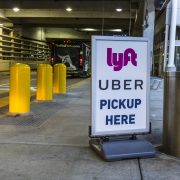Free Market Competition Makes the World Go Round
When a business folds or decides to close up shop, there is usually a sense of sadness lingering in the air. But as has been discussed in the past, market failure is not a bad thing. And for consumers, it is quite excellent. One such example of this can be found in the ridesharing sector.
When the D.C.-based ridesharing company, Split, gave its last ride last year, patrons complained that this closure was a result of companies like Lyft and Uber having an unfair advantage over the competition. But many forget that this “unfair” competition is actually making ridesharing better for everyone.
In a town dominated by Lyft and Uber, Split was not able to carve out enough of a niche in the local ridesharing market. While this is surely not what Split had intended when it began its operations, competition is, after all, just a part of the market process.
Ridesharing has been one of the most free-market innovations of our time. For virtually 80 years, the traditional cab industry has had an unchallenged monopoly. When you’re the only game in town there isn’t much incentive to improve your services. Which is exactly what happened with the taxi industry.
Without a motive to innovate, the cab companies enjoyed an almost century-long reign as their services got progressively worse. Inefficiency, inconvenience, and unpleasantness became adjectives commonly associated with the typical cab experience.
Luckily, the smartphone generation found a way to improve both the quality and cost of the services historically rendered by the cab industries. Customers would no longer have to stand outside attempting to hail a cab while fighting other metropolitan dwellers for a ride. Instead, ridesharing companies utilized something most people already had: smartphones.
Finally, there was a way to improve the quality, safety, and the overall experience of a taxi ride without having to deal with the cab companies.
The cab companies did not have to deal with a direct threat to their business model and have since done everything in their power to ask local governments to regulate the ridesharing industry into oblivion. While the cab cronies have enjoyed mild success in their quest, especially in Massachusetts where a tax was recently instituted which would require ridesharing companies to literally help fund their competition, the union bigwigs have not been able to completely decimate their competition and that is simply because there is a huge demand for ridesharing services.
Now, consumers have options, not only between ridesharing and traditional cab companies, but within the ridesharing genre itself. While Uber enjoyed the first success in the market, other ridesharing apps like Lyft, have also become household names.
The cab companies have been able to survive without any real competition thanks to government subsidies and protections, something the ridesharing market has not been privy to. Without having to really compete to stay afloat, the cab companies could get away with providing low-quality services because there was no real threat of failing. Ridesharing companies, however, have not had that luxury. Each business has had to constantly assess where it stands with respect to its competition.
As a result, ridesharing companies are constantly innovating to differentiate themselves. Split, for example tried to be the app known for the cheapest rides in the District of Columbia, as long as you were willing to share your ride with other passengers going to nearby locations.





